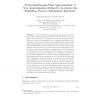509 search results - page 2 / 102 » Using Learning for Approximation in Stochastic Processes |
NIPS
1998
13 years 6 months ago
1998
Inference is a key component in learning probabilistic models from partially observable data. When learning temporal models, each of the many inference phases requires a complete ...
FORTE
2004
13 years 6 months ago
2004
Passage time densities are useful performance measurements in stochastic systems. With them the modeller can extract probabilistic quality-of-service guarantees such as: the proba...
RECOMB
2007
Springer
14 years 5 months ago
2007
Springer
Abstract. Given the substantial computational requirements of stochastic simulation, approximation is essential for efficient analysis of any realistic biochemical system. This pap...
JMLR
2010
12 years 12 months ago
2010
Continuous-time Bayesian networks is a natural structured representation language for multicomponent stochastic processes that evolve continuously over time. Despite the compact r...
ICML
2009
IEEE
14 years 6 months ago
2009
IEEE
Relational world models that can be learned from experience in stochastic domains have received significant attention recently. However, efficient planning using these models rema...

